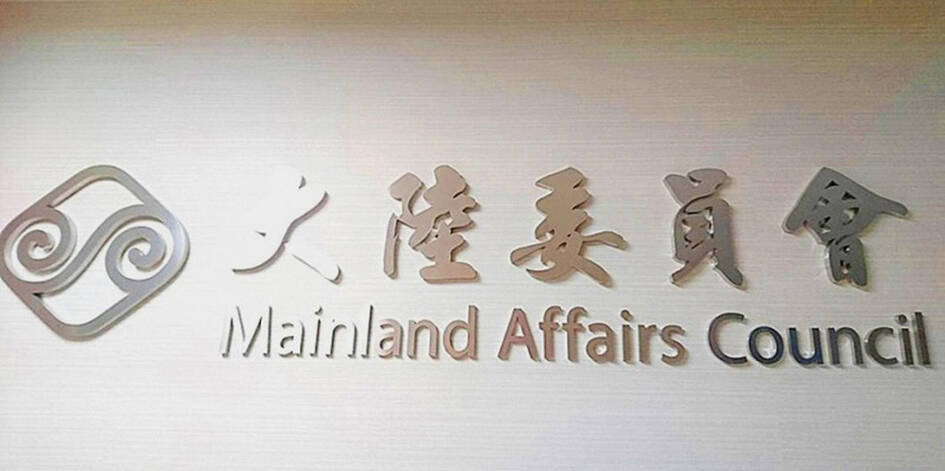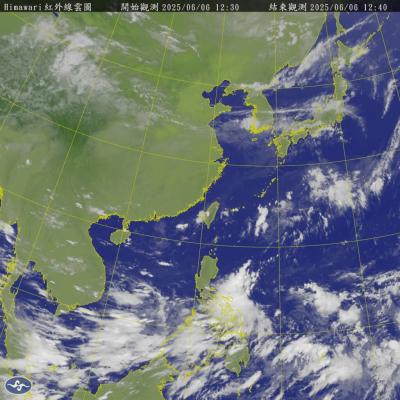Former head of the Chinese Nationalist Party’s (KMT) Huang Fu-Hsing chapter Tsang You-hsia (臧幼俠) and others might have broken the law when they allegedly stood for and sang the Chinese national anthem, the Mainland Affairs Council (MAC) said yesterday.
Local media yesterday reported that Tsang and Republic of China Military Academy Specific Subject Course Alumni Association chairman Chiang Cheng-lung (蔣成龍) allegedly attended an event hosted by the China Council for the Promotion of Peaceful National Reunification in Hong Kong on Aug. 20.
The two allegedly stood to attention when the Chinese national anthem was played and its national flag raised, which might constitute an offense after the Act Governing Relations Between the People of the Taiwan Area and the Mainland Area (臺灣地區與大陸地區人民關係條例) was revised in 2016.

Photo: Chung Li-hua, Taipei Times
The MAC yesterday said that the individuals’ original serving agency would head an investigation and prosecute them to the full extent of the law if the accusations are proved.
If found guilty, Tsang and Chiang would have to return their pensions — either 50 percent or in their entirety — within five months of Aug. 20, or if the agency finds their actions to be a severe offense, their pensions would be revoked and all money received would have to be returned to the state.
Democratic Progressive Party (DPP) Legislator Wang Ting-yu (王定宇) yesterday said that the China Council for the Promotion of Peaceful National Reunification was founded by the Chinese Communist Party (CCP) and is known to be headed by a member of the party’s politburo.
Tsang and others attending a CCP-founded organization ahead of yesterday’s Armed Forces Day resulting in scandalous rumors is an insult to all those in the military defending their nation, he said.
DPP caucus secretary-general Rosalia Wu (吳思瑤) said that if Tsang, a former military official tasked with safeguarding Taiwan, is proven to have acted in ways that undermine national dignity, no military personnel would support him.
The KMT yesterday said that Tsang had not been a party official for many years and had attended the event in a personal capacity, adding that he should make a statement about the incident.
As of press time last night, Tsang was unavailable for comment.
The 2016 amendment to the act states that people serving as the deputy head of the national defense, foreign affairs, mainland affairs, national security or other agencies or who attained the rank of major general before retirement are banned from conducting themselves in a manner that would undermine national dignity at affairs or events held by the CCP, the Chinese military, or Chinese administrative or political organs.
The same amendment defines actions that would undermine national dignity as saluting the Chinese national flag or emblem or singing songs representing the government of China.
Additional reporting by Shih Hsiao-kuang

STAY AWAY: An official said people should avoid disturbing snakes, as most do not actively attack humans, but would react defensively if threatened Taitung County authorities yesterday urged the public to stay vigilant and avoid disturbing snakes in the wild, following five reported snakebite cases in the county so far this year. Taitung County Fire Department secretary Lin Chien-cheng (林建誠) said two of the cases were in Donghe Township (東河) and involved the Taiwan habus, one person was bit by a Chinese pit viper near the South Link Railway and the remaining two were caused by unidentified snakes. He advised residents near fields to be cautious of snakes hiding in shady indoor areas, especially when entering or leaving their homes at night. In case of a

A tropical disturbance off the southeastern coast of the Philippines might become the first typhoon of the western Pacific typhoon season, the Central Weather Administration (CWA) said. The system lacks a visible center and how it would develop is only likely to become clear on Sunday or Monday, the CWA said, adding that it was not yet possible to forecast the potential typhoon's effect on Taiwan. The American Meteorological Society defines a tropical disturbance as a system made up of showers and thunderstorms that lasts for at least 24 hours and does not have closed wind circulation.

ENERGY RESILIENCE: Although Alaska is open for investments, Taiwan is sourcing its gas from the Middle East, and the sea routes carry risks, Ho Cheng-hui said US government officials’ high-profile reception of a Taiwanese representative at the Alaska Sustainable Energy Conference indicated the emergence of an Indo-Pacific energy resilience alliance, an academic said. Presidential Office Secretary-General Pan Men-an (潘孟安) attended the conference in Alaska on Thursday last week at the invitation of the US government. Pan visited oil and gas facilities with senior US officials, including US Secretary of the Interior Doug Burgum, US Secretary of Energy Chris Wright, Alaska Governor Mike Dunleavy and US Senator Daniel Sullivan. Pan attending the conference on behalf of President William Lai (賴清德) shows a significant elevation in diplomatic representation,

Credit departments of farmers’ and fishers’ associations blocked a total of more than NT$180 million (US$6.01 million) from being lost to scams last year, National Police Agency (NPA) data showed. The Agricultural Finance Agency (AFA) said last week that staff of farmers’ and fishers’ associations’ credit departments are required to implement fraud prevention measures when they serve clients at the counter. They would ask clients about personal financial management activities whenever they suspect there might be a fraud situation, and would immediately report the incident to local authorities, which would send police officers to the site to help, it said. NPA data showed